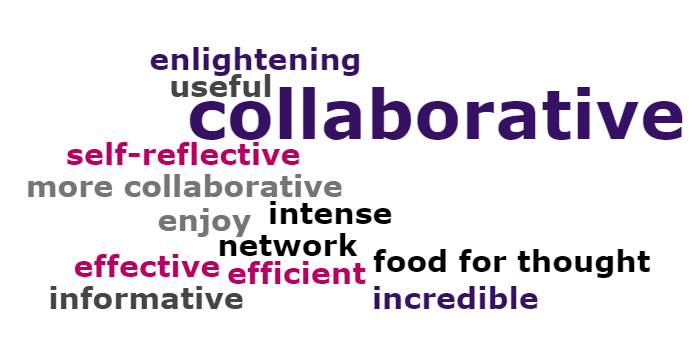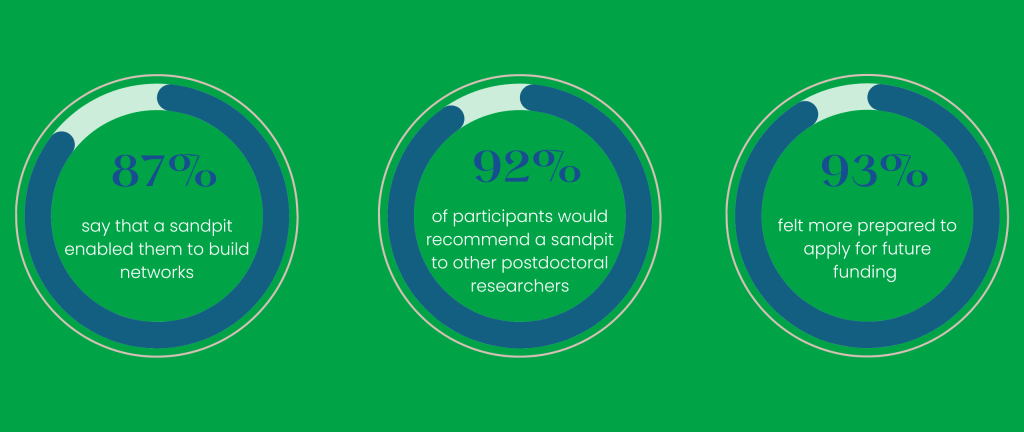The Postdoctoral Researcher’s Guide to Research Sandpits

Sandpit participants respond: what word you choose to describe your sandpit experience?
In its simplest form, a research sandpit is a means to develop novel research. But for postdocs, it’s much more than that. Being part of a sandpit not only allows you to learn how to create a research proposal that will qualify for funding – but grows your network and is a great way to unlock your research independence.
Sandpits are designed to put participants straight into the action. After all, what better way to learn how to create a winning research proposal – than creating a proposal that could get your research funded! C-DICE offers up to £30k in seedcorn funding to the winning team of the sandpit to pursue their research project.
If you’ve never participated in a research sandpit before, you might be unsure of what to expect and if it is the right opportunity for you. We’ve put together a guide to how a C-DICE sandpit is run, so you know exactly what being part of a research sandpit is like.
1. Getting Started
The sandpit begins with an introductory session, hosted by C-DICE facilitators. They will be your guide throughout the process (think: supervisor) and will explain the research problem to all participants. This will be an interactive session that includes exercises and group discussions – which will help to introduce the concepts of interdisciplinary working and encourage collaboration from the start.
Most importantly, these exercises will allow for you to get to know all the other participants. This will come in handy when you get to day 2, as that’s when you get to….
2. Choose Your Team
In the second session, participants will be asked to create self-forming teams. Based on the previous day’s interaction, you will already know about their expertise and interests to effectively create a team that will then go on to write the research proposal. With your newly formed team, the C-DICE facilitator will equip you with all the information you need to begin work on your research proposal – starting tomorrow, the work begins.
If at this stage, you find that the sandpit is not right for you – you have the chance to quit the activity. No hard feelings, we promise!
Note: For our upcoming Hydrogen sandpit, the first two sessions will be hosted in person at Loughborough University. You can benefit from a travel grant and support for caring responsibilities if you wish to attend.

3. Working Together
We highly recommend that on the third day, the teams get together to distribute tasks and form a plan of action. This could be all in person, virtual – or any way that works best for your team. From this day on, the teams are given a few days in which to create a first draft of their proposal.
4. Feedback and Further Work
This initial draft will be submitted for review and teams will hear back from us in one week’s time. The next six weeks are for the teams to then work together to draft their winning research proposal. Teams are encouraged to reach out and ask any questions they might have for the C-DICE team during this process.
In this time, you will be eligible to apply for a networking grant to facilitate team meetings which will keep the process running smoothly for all participants.
5. Training Events
C-DICE also supports your career development AND sandpit proposal with relevant training. We strongly recommend participants attend the budgeting and EDI (Equality, Diversity, and Inclusion) workshops – both crucial elements to include in a winning research proposal.
6. Submission
Simply submit your proposal online before the deadline – after which all submissions will be peer reviewed by the C-DICE team. Your final submission is based around the same requirements as the UKRI, thus providing key skills for future proposals. The teams will then make a presentation, outlining their work and future direction.
Winners will be announced following the presentations. Remember, the full £30k available for funding may not go to just one team and could be distributed among multiple proposals!
Conclusion
You will walk away from the research sandpit with a larger network, new skills and potentially funding for a research project. This opportunity is available to postdoctoral researchers in any field and does not require specific expertise in the sandpit topic as transferable skills are key. If this looks like the next step that your postdoctoral research career needs – sign up now for a #cdicesandpit.